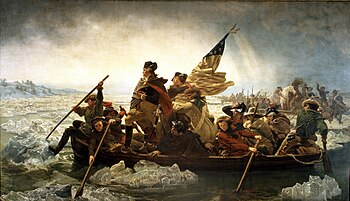The Crossing - The decisive battle
| Movie | |
|---|---|
| German title | The Crossing - The decisive battle |
| Original title | The crossing |
| Country of production | United States |
| original language | English |
| Publishing year | 2000 |
| length | 88 minutes |
| Rod | |
| Director | Robert Harmon |
| script | Howard Fast |
| production | David Coatsworth |
| music | Gary Chang |
| camera | Rene Ohashi |
| cut | Zach Staenberg |
| occupation | |
| |
The Crossing is an American historical film from 2000 . The literary adaptation of the historical novel The Crossing (1971) by Howard Fast was produced for television and tells the story of George Washington's troops crossing the Delaware River and the Battle of Trenton . The film is also known under the title George Washington: Victory over the Hessian Mercenaries and The Battle of Delaware .
action

With the start of the American Revolutionary War, the British overrun Manhattan and drive George Washington , as well as over 20,000 men and 300 cannons to flight. About six months later, on December 7th, 1776, his army dispersed and he has just over 2,000 men left. He is on the New Jersey Shore and wants to cross the Delaware River to find safe refuge near the Pennsylvania Shore . They get boats and barely manage to cast off from the bank under enemy fire. But the losses are enormous. Washington has fewer than 2,000 men at its disposal, only 18 cannons, and it lacks everything. He has hardly any supplies, money, blankets, medicine and has no hope that he will soon get supplies. And it gets worse because the British have positioned over 1200 Hessians near them, waiting for the river to freeze over so they can cross it to defeat Washington in a devastating battle. And after individual troops, including General Greene and Stirling appear with 872 other exhausted men, the situation comes to a head, because the Continental Congress has to flee from Philadelphia to Baltimore and gives Washington all the powers it needs until the situation improves.
And he also uses it to launch an unexpected direct attack on the Hessians on Christmas, December 25th, 1776. He does this against the skepticism of individual subordinates, including Horatio Gates . But Washington is not deterred, because he knows how bad things are for his troops, so that only one attack can save them. So the preparations are under way in the cold rain, in order to be in a great hurry with the Hessians before six o'clock in the morning so that the surprise effect is on your own side. But the cold and snow make the journey more difficult, so that they only arrive on the other bank, a few miles away from the Hesse regiment, in daylight. After they overrun the Hessian sentry box, they rush to Trenton, where, thanks to a clever tactic, they manage to encircle the Hessians relatively quickly, so that Colonel Johann Rall , after being fatally wounded, is forced to give up. Rall dies shortly afterwards, and Washington urges everyone to take all supplies with them so they can begin their retreat. Because for him it was a miracle that no one was injured, which is why, after winning the first battle in over 12 months, he does not want to challenge the fortunes of war in order to be able to prepare for a long war.
criticism
“Skilfully staged, adequately played television film that illustrates the history in a detailed and stimulating way. The elaborate camera work deserves special mention, the atmospheric imagery of which is reminiscent of historical paintings. "
Awards
- a nomination at the 2000 Primetime Emmy Awards for Best Sound Editing
- an award for Rene Ohashi at the ASC Award in the category Outstanding Achievement in Cinematography in Movies of the Week / Mini-Series / Pilot (Basic or Pay)
- a 2001 Peabody Award
publication
After the film ran on January 10, 2000 on the US television station A&E Network , it was broadcast for the first time in Germany on January 10, 2001, on the pay-TV station Premiere World the following year . The film has been available on VHS since February 13, 2002 .
Web links
- The Crossing - The decisive battle in the Internet Movie Database (English)
- The Crossing - The decisive battle in the German dubbing index
- The Crossing - The decisive battle in the online film database
- The Crossing - The decisive battle at Rotten Tomatoes (English)
Individual evidence
- ^ The Crossing in the Lexicon of International Films , accessed April 2, 2012